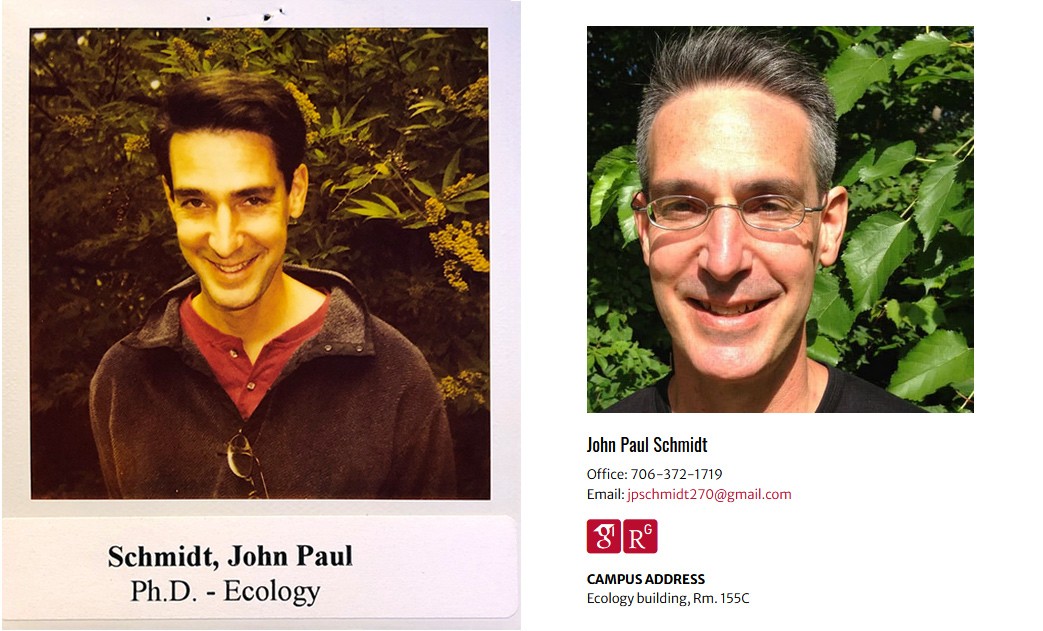J.P. Schmidt, PhD ’06, is a lecturer at the Odum School of Ecology. He recently talked with Ecology AB major Sam Patterson about his path to working with epidemiology and ecology, tips on forming a professional “niche,” and advice for postgraduate students. This interview has been edited for length and clarity.
Sam Patterson: How would you describe what you do?
J.P. Schmidt: I think of myself as a plant ecologist. My background is mostly in botany and plant biology, but what I mostly do now is the ecology of human infectious disease. I started as more of a naturalist and got my master’s in botany. Then I did a lot of remote sensing and landscape surveying and went back to get my Ph.D. in ecology. This brought it all together, as I did a lot of population ecology and became familiar with statistics and modeling.
SP: I read that you also have a B.A. in philosophy from Emory. How did you go from there to what you do now?
JPS: I went into college interested in biology. At Emory, however, the biology program was very med school-focused, and I got frustrated with how the classes were taught. I was also interested in philosophy and enjoyed my first few classes and professors. I think my background in philosophy has helped me to place science within a larger context.
SP: What was your career path like after your eventual switch to ecology?
JPS: I first came to Athens in 1990 to do my master’s here, and eventually found work as a lab technician around 1998. After working several years as a GIS technician, I did a Ph.D. in ecology and a postdoc with the Park Service on monitoring vegetation in parks. This led to work on invasive plants, trying to predict them based on traits using machine learning. I eventually began to work on zoonotic pathogens rather than invasive plants, and to study ecological trends in disease outbreaks.
SP: To touch on that idea of diseases more; how did your work with epidemiology relate to the recent COVID-19 pandemic?
JPS: I actually haven’t done much work with COVID directly. Most of what I do focuses on disease “spillover” and where disease is likely to happen and why. COVID is very interesting, but, because it’s a new disease, the data we have is very limited.
For those who may be unfamiliar with the term “zoonotic spillover”: this occurs when an animal population harbors a pathogen, and comes into contact with humans, transmitting the pathogen to people. Sometimes these pathogens can cause high mortality in humans and/or transit from person to person, other times humans are dead-end hosts.
One idea that has become more interesting to scientists is that conserving biodiversity could help mitigate the spread of zoonotic disease. The general public seems to have not really thought about this before; but it’s important to start making connections between the management of our environment and how that can affect disease spillover.
SP: How did the Odum School of Ecology help you along your path?
JPS: Well, I never really left Odum. I like it because there are many different research groups that I fit into due to my diverse skill set. I think the real advantages of Odum for me are the people and projects I’ve worked with, people like John Drake and his work with disease groups, another person being Laurie Fowler. It’s huge being in an institution where we have key speakers coming in all the time, in addition to the faculty and grad students that also present [their work]. There is a strong cohort of grad students in Odum that is much more collaborative than other departments at UGA, I think. That was a huge help for me as well.
SP: What advice do you have for students looking for an internship or lab?
JPS: You really need to be a networker. Talk to people and find out what they do, and what sort of opportunity they might have for you. I also think going to a lot of talks is important. I get frustrated when students don’t ask questions. As a student, I often didn’t understand what someone was showing me until I asked questions. I think that was a big part of my development.
It’s often worth asking people if there’s a way you can fit into their research projects. You must be ready to face some rejection, but that’s no different than any other aspect of life.
It’s also important not to fear math classes. Don’t be afraid to take calculus, or learn a coding language, because they are critical skills in doing ecology. Other important skills to have: understanding GIS and generally understanding statistics. Don’t fear them; use them to your advantage.
SP: What is your most memorable experience in the field?
JPS: My most memorable recent experience in the field was almost stepping on a fer-de-lance (venomous snake) near the “professor’s house” at the former UGA Costa Rica campus. Glad I looked down when I did. Fer-de-lances aren’t supposed to be up that high in elevation, but they seem to be shifting up with climate change.

